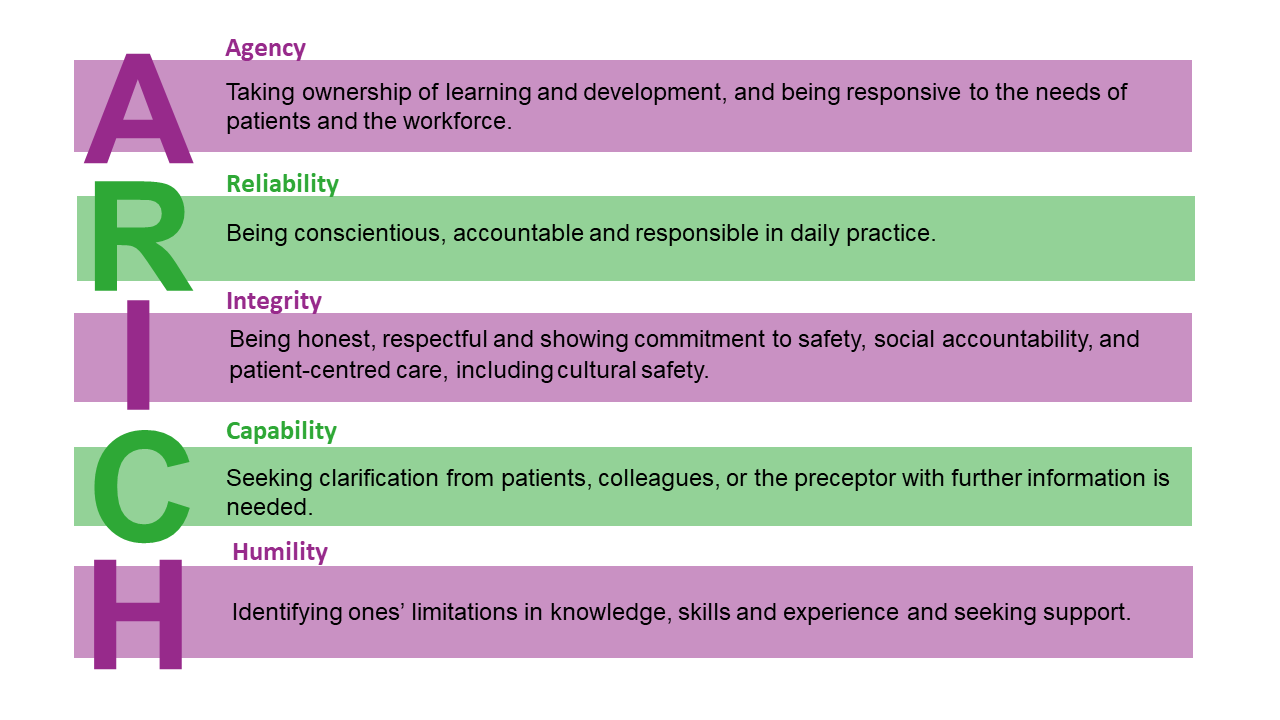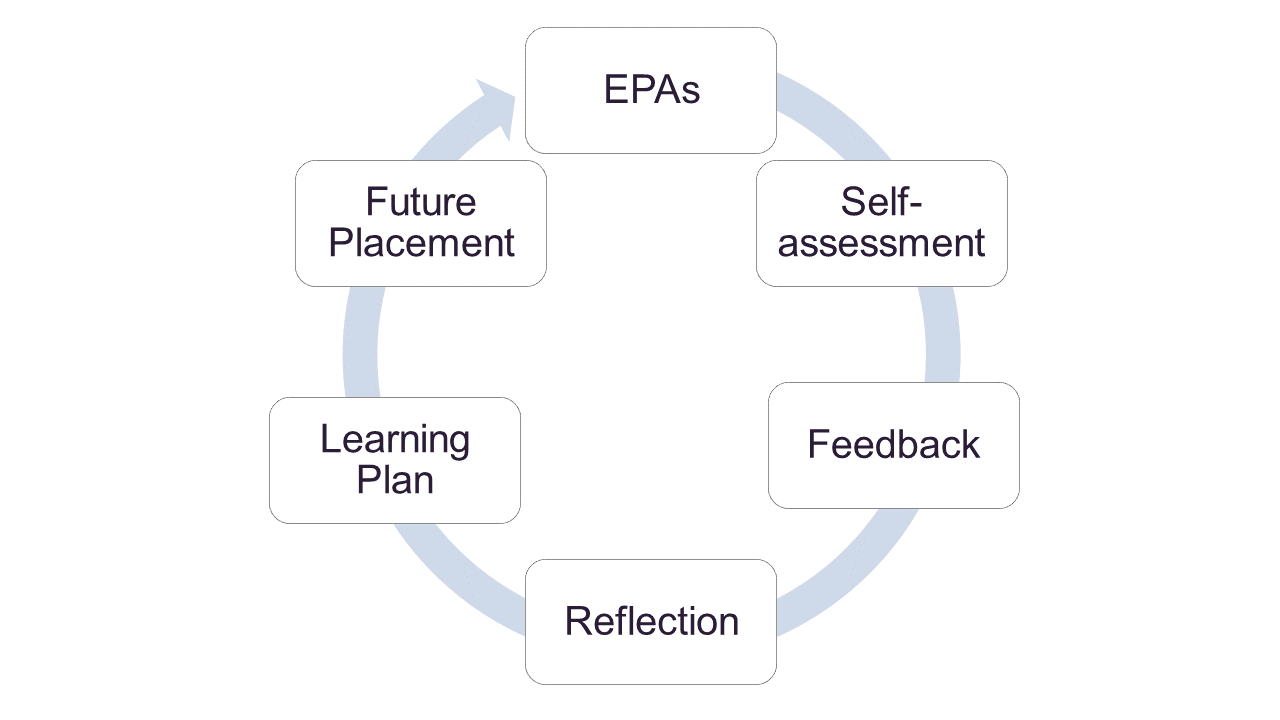42 Entrustable Professional Activities (EPAs)
In this video, Dr Jane Lee introduces Entrustable Professional Activities and how they are used as a framework for learning and feedback during placement.
Learning on placement: Entrustable Professional Activities (YouTube, 5.40ms)
Note that EPAs are used in placement activities for the following courses only: PHRM2102, PHRM3101, PHRM3102, PHRM4062, PHRM4072 and PHRM4071.
An Entrustable Professional Activity (EPA) is an observable professional activity, such as a task or responsibility, that can be fully entrusted to a trainee once they have demonstrated the necessary competence to execute the activity unsupervised.
EPAs are used in the Australian Pharmacy Council (APC) internship programs as a work-based assessment; for further information on EPAs, please visit the APC page Introduction to Entrustable Professional Activities. The Bachelor of Pharmacy (Hons) has aligned its workplace activities with this format to prepare students for the work-based assessments they will undertake during their internship program. The EPAs form an integral part of the placements in the Bachelor of Pharmacy (Hons) program and have been developed to identify key professional activities relating to patient care or safe healthcare in the workplace, which are aligned to the National Competency Standards Framework and the Australian Pharmacy Council performance outcomes.
Entrustable Professional Activities in the Bachelor of Pharmacy (Hons)
There are six skills-based categories of EPAs in the Bachelor of Pharmacy (Hons):
- Prescription Fulfilment
- OTC Medicine Management
- Patient Education
- Medication History, Reconciliation and Review
- Non-clinical Skills
- Complex Clinical Skills
Click the plus icons below for more details on each category
You will complete EPAs from different categories each placement. The infographic below provides an overview of the categories of EPAs that are completed across the program:
Click on the image to enlarge

You will undertake your first placement in semester 2 in the second year of the program. In this placement, the EPAs focus on foundational skills in prescription fulfilment, and OTC medicine management. In the third year of the program, the EPAs focus on OTC medicine management, Medication history, reconciliation and review, and Patient education. By the fourth year, the EPAs continue to evaluate skills in OTC medicine management and Medication history, reconciliation and review, as well as non-clinical skills and complex clinical skills.
Within each category, the EPAs have been designed to increase in complexity as you progress and so you have the opportunity to apply your skills in a range of professional contexts.
Level of Entrustment
The level of entrustment is decided at the end of the placement after preceptors have observed you undertaking the EPAs. This is represented as a numerical value on a scale of 1-5, however, entrustment level 5 is outside the scope of the Bachelor of Pharmacy (Hons).
It is important to note that an entrustment level is not a grade and does not contribute to your overall course outcomes, but rather, it is intended to help you monitor your progress across your program and identify areas for further development.
Your level of entrustment will not always increase from placement to placement, as the complexity of the activity and the work context or level of risk changes. For example, it is expected that a student would receive a lower level of entrustment on a hospital EPA, such as medication chart review, in their third year than they would on a community pharmacy EPA, such as dispensing a prescription, in their second year. Some EPAs, such as provision of OTC medicines, are completed in each placement across the program, therefore, it would be more likely to see an increase in the level of entrustment between placements.
Click the plus icons below for more details on each entrustment level
Qualities that enable entrustment
EPAs have been designed to include qualities that enable entrustment; the APC references the research of Cate & Chen (2020), in which the authors propose a model for entrustment decision making using the acronym A RICH: Agency, Reliability, Integrity, Capability, and Humility. For further information on the qualities that enable entrustment, please see the APC page Introduction to Entrustable Professional Activities
These qualities are referred to as Entrustable Attributes in your self-assessments. Students should familiarise themselves with A RICH and refer to these qualities when completing their self-assessments and reflections. When providing the Entrustment level, we ask preceptors to consider A RICH as well as performance of clinical skills, and provide you with constructive feedback on your self-assessments of the Entrustable Attributes.
Click on the image to enlarge

Connection to coursework
The EPAs align with our philosophy of student directed learning in the Bachelor of Pharmacy (Hons); you will use the EPA templates to seek specific feedback, track your progress across the program, and identify areas for improvement. The EPAs completed during placement are important for the overall course assessment and for future placements, however, the entrustment decisions do not affect your final grade. You are assessed on your ability to reflect and create a learning plan based on your performance, placement experiences, and feedback.
Both preceptors and students have an active role in completing the EPAs. For the preceptor, it’s important to carry out short practice observations during the placement so that the level of entrustment decision is based on multiple observations of the student undertaking these activities at different points in time. It’s also important to provide the student with feedback throughout the placement and to help them to consider ways in which they can improve.
The student’s role is to carry out the EPAs responsibly and seek feedback, as well as initiate the final feedback process at the end of the placement by completing a self-assessment in the ePortfolio. When you submit your self-assessment, the preceptor will receive an email with a link to complete their feedback in the ePortfolio. You will use this feedback in your reflection and learning plan assessments, where you develop your goals for the next placement.


